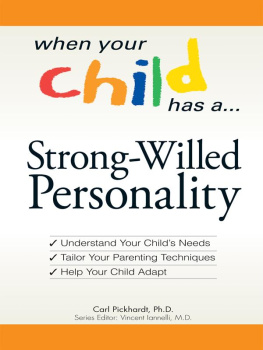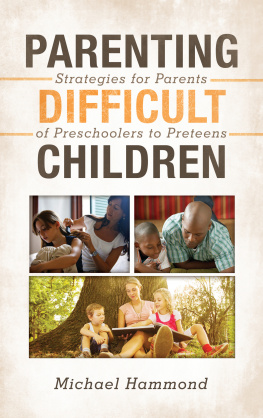Parenting the Strong-Willed Child
Fortifying Our Youth and Healing Our Prodigals
Kevin Hinckley
2008 Kevin Hinckley.
All rights reserved. No part of this book may be reproduced in any form or by any means without permission in writing from the publisher, Deseret Book Company, P.O. Box 30178, Salt Lake City Utah 30178. This work is not an official publication of The Church of Jesus Christ of Latter-day Saints. The views expressed herein are the responsibility of the author and do not necessarily represent the position of the Church or of Deseret Book. Deseret Book is a registered trademark of Deseret Book Company.
Library of Congress Cataloging-in-Publication Data
Hinckley, Kevin.
Parenting the strong-willed child: fortifying our youth and healing our prodigals/Kevin Hinckley.
p. cm.
Includes bibliographical references and index.
ISBN 978-1-59038-917-1 (paperbound)
1. Mormon children. 2. Child psychology. 3. ParentingReligious aspectsMormon Church. 4. Child rearingReligious aspectsMormon Church. I. Title.
BX8643.C56H56 2008
248.8'450882893dc22
2008005299
Printed in the United States of America
Publishers Printing, Salt Lake City, UT
10 9 8 7 6 5 4 3 2 1
To Cindy,
whose love and constant support
made this book a reality
One
The Premortal Rebellion
Children are natural mimics who act like their parents despite every effort to teach them good manners.Author Unknown
A few years ago, I was asked to conduct a team-building training exercise for a firm in Dallas, Texas. The employees were having a hard time working together, and their supervisor was anxious to help them become a more cohesive group. I arranged for them to meet me at a local Boy Scout camp where we had a day of team-building exercises and fun.
In order to help them better understand themselves, I began with an activity called the Blind Maze. It consisted of a rope running down through the woods, around trees, over creeks, across logs and so forth, in a maze configuration. The team members were blindfolded and brought to a place at one end of the rope. I instructed each one to hold tightly to the rope, to follow it whereever it led, and to not let go. Finally, I explained they would know they'd reached the end because someone would be there for them.
The purpose of the maze activity, with any group, is to help individuals learn something about how they solve problems. When blindfolded, some become very cautious and tentative; some seek out others they can work with. I've had some participants, in other groups, sit down and cry out of frustration. The simple reality of the Blind Maze is that it is a metaphor for their lives. As I told them that day, You will do this maze the way you do your life.
After the activity was well under way, I turned to answer a question from one of the other facilitators. When I looked back at the course, I noticed that one adventurous soul was already showing how he dealt with difficult situations. He had let go of the rope and had begun blindly walking across a field. What he did not know was that he was quickly approaching a thirty-foot-high embankment that ran along a creek bed. In horror, I sprinted across the field, tackling him just as he was about to fall over the ledge and down into the creek.
As I helped him up, he never said a word. I took him back to the rope and explained again how vital it was that he not let go again. Then I watched himmuch more carefullyuntil he successfully completed the activity.
Afterwards, we talked about the exercise with the entire group. I explained what had happened. I then asked my wandering friend if this incident was indicative of how he lived his daily life.
What do you mean? he asked.
Well, I explained, you were given instructions that would lead you safely to the other end of the rope. Instead, you let go, wandered off blindly, and nearly fell down the embankment. You avoided injury only because I happened to see what you were doing. I then had to knock you down to save your life! I'm wondering how often you simply let go during difficult times, leaving everyone around you to guess where you went?
He thought about it for a moment, then shook his head and shrugged. I don't think I ever do, he replied.
When I asked the group if this was typical behavior for their colleague, I got a far different response. They all nodded, enthusiastically, in agreement. They explained that he frequently went off on his own during difficult assignments. Eventually, someone would rescue him and bring him back to the rest of the group. They agreed that his behavior on the maze was a mirror image of what they saw him do every day.
When I asked why he had let go of the rope, venturing out on his own, and having no idea where he was going, he could only answer, I don't know!
Later, as I thought about his behavior, I wasn't sure which aspect was more troublingthe fact that he constantly walked off on his own, or the fact that he didn't know why he did so.
A few years ago, BYU professors Brent L. Top and Bruce A. Chadwick completed a study of LDS seminary students, using a large sample of kids, living in several states. The researchers were able to follow up with fifty young LDS girls, who admitted that they had succumbed to serious morality problems. All these girls had grown up active in the Church. They had heard about the importance of living the law of chastity in untold Sunday School and youth classes. Their LDS parents had endeavored to teach morality in their homes. Yet, in a heated moment, all these teachings and warnings had been discarded, and they had yielded to temptation.
The researchers asked the same question as I had to my friend on the Blind Maze: Why did you do it? Amazingly, over 59 percent of them answered the same way he had, I don't know! (See 10 Secrets Wise Parents Know [Salt Lake City: Deseret Book Company, 2004], 88.)
And they didn't. When it came time to say yes or no, they had been persuaded to violate sacred covenants without an explanation as to why.
As parents and youth leaders, we worry constantly about the young people of the Church and their potential for rebellion. We have no illusions about the intensity and persuasiveness of the messages they are exposed to every day. We see their values being challenged on every side. We worry as we watch teens roll their eyes at church assignments or grow restless during spiritual discussions. As they grow older, some seem to become frustrated with Church rules and parental restrictions; and they push to see just how far they can extend the parameters. Some go so far as to ask their bishop, How far can I go without sinning? Then, when they quit attending church, many will respond with something like, Hey, it's just not for me! or It was boring. Later, they will rationalize their behavior by saying, Look, I'm not sure I believe all that church stuff anymore.
Having watched such kids over the years, I find myself wishing I could implant a voice in their brain that would shout: Hey, this is your eternal life you're playing with! Don't you realize what you're doing? What are you thinking?
As any parent of a wandering child can attest, modern-day prodigals ignore all prior warnings and willfully let go of the safety rope. They think they're immune to consequences, and feeling that no one has the right to tell them what to do, they stumble toward dangers they don't immediately recognize. Blinded by fads, popular opinions, and the invitations of friends, they fail to see the upcoming cliff their parents and leaders have warned them about.












